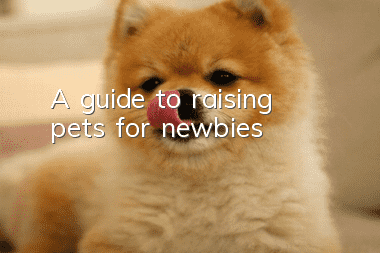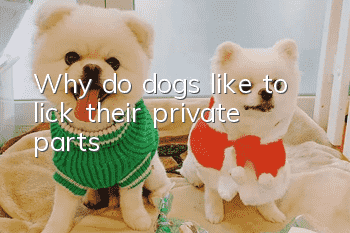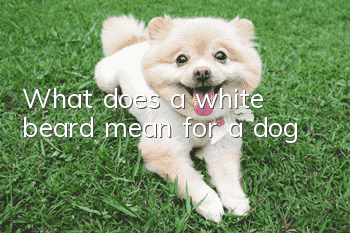A guide to raising pets for newbies

"Why does the puppy I took home with joy have so many bad problems that cause headaches? How can I correct these problems?" This is the question I am asked most by some novice owners. When their full love turns into endless barking, urinating and urinating without warning, and random biting of furniture, and the expected cute and cute pets turn into little devils, they will complain to me in disappointment and powerlessness. Indeed, for novice owners who have no professional training knowledge, these are indeed headaches. But it is also precisely because these new family members are still in their early childhood, the behaviors and habits of this period will affect or even change the dog's life. A dog's puppyhood is like a blank piece of paper, and the subsequent patterns are filled in by the owner's scribblings. If the owner can establish good habits for the puppy, then you will all use this as a basis for the next few decades. Harmonious and happy company. On the contrary, these problems that may not seem too serious now will be more thoroughly exposed and more difficult to deal with when the dog reaches adulthood.
Samoyed
Every dog and every family may have their own different problems. I can't propose solutions to them all in person, but I think the most important thing is that you need to understand the two principles of dealing with dog problems. In theory, you can only You need to do two things to ensure that your puppy grows up the way you want it to: set the right rules and manage the environment well.
Have you ever taught your dog what is right?
I have asked many novice owners who have this question: "Have you taught your dog what is right?" Most of their answers are "No, but I have warned it what is wrong, and I am sure it knows it too, because I When I educate it, it will look at me pitifully." If it is true, as the owners said, that the dog has made a mistake, why does it still make another mistake after a period of time (maybe just a while)? Is it because it Did you knowingly and deliberately provoke your master by not taking his words seriously?
We always attach many meanings to our dog's behavior according to our interpretation: for example, it understands our language, it is humane, or it understands that this is wrong. If it insists on going its own way and repeats mistakes, it probably doesn't recognize me as its master. It thinks its status is higher than mine. Unfortunately, the development of animal behavior and animal psychology has gradually verified that these "guessed" dogs' inner monologues are probably wrong, at least not necessarily correct.
In fact, although the intelligence of most dogs can reach the level of a 2-year-old child (puppies will have lower intelligence because they have not fully developed), they are still far from being able to communicate with people and understand human demands. Facing their owners, dogs are actually establishing a relationship from beginning to end. However, this relationship is often direct and does not represent the meaning of human interaction.righteous connection. For example, your dog may make an apologetic expression to you when he does something wrong, or he may simply run away. This does not mean that it is aware of its mistake, but because it has been punished for it. It may have been scolded or beaten. Its "sorry" is just a direct response to you punishing it, not you. Looking forward to it, it understood the connection between this punishment and the wrong thing. To put it simply, it is just afraid, not that it understands.
Does punishment really work?
Some people seriously emphasize the timing of punishment, thinking that as long as the punishment is timely, it will be enough. For example, if a puppy urinates everywhere, he thinks that as long as he catches it and punishes it when it makes a mistake, it will understand. It is a pity that this is another wishful thinking of human logical speculation. The moment the dog urinates and is punished, the direct connection established is between peeing and the owner. It will think: I can never pee in front of the owner again, because He will be cruel to me, which may lead to him secretly peeing behind your back in the future where you can't see him, leaving you with no chance to punish him. Even if we take a step back and assume that it understands that it cannot go to the toilet here, the key point is, does it understand where it should go to the toilet? This is like locking a person in a room without a toilet and living there forever. I'm afraid he will eventually abandon the toilet habits that humans have formed and "make mistakes". So for many things, it’s not that the dog doesn’t want to do the right thing, or is deliberately provoking you, it’s just that it doesn’t understand how to do the right thing, or even what is right, because the owner has never set the boundaries of “right”. The "right" area is often hidden unconsciously.
This is the first principle I mentioned - tell the dog what is right. Stop hiding from the masters and tell your babies what is right. When you see it start to sniff the ground and circle around (a sign before urinating), gently pick it up and put it where you think it is right, then encourage it gently and gently, and wait until it does it. Praise it happily when you are right, and then give it some of the food it loves. After a few times, you will find that it will come to you excitedly after going to the toilet, as if to say to you: Look, I did it right. Should I get some reward? Now you and the dog are both happy. Isn’t this the best result?
In fact, teaching puppies the right things can be used in almost all behavioral problems. For example, when it comes to chewing furniture, we teach it that it can only get our attention and rewards when it chews its own toys; for example, in recall training, we teach it every Every time it is called back, there will be a big hug and delicious food from the owner; for example, if a dog is very active and we want it to be quieter, then we will praise it more when it is quiet, and when it is naughty, we will try our best to To reduce interaction with it......These are the "positive reinforcements" often mentioned in training: reward it for correct behavior more, and this correct behavior will continue to occur. (Positive reinforcement deserves another article to explain, so I won’t go into details here)
Do a good job in environmental management to prevent possible mistakes!
Although you may have been able to tell your dog the right things, sometimes mistakes will inevitably occur. For example, you cannot ask a completely untrained puppy to remain calm in the face of sudden food temptations. You need to know Food is almost more attractive to puppies than anything else. It is a fantasy to hope that an unsupervised dog can still "sit calm" in the face of delicious food that is readily available? In the world of dogs, it is instinct to eat delicious food. They do not have the concept of "stealing is wrong", it is just a rule set by us humans.
At this time, you need to use the second principle - good environmental management. What is environmental management? It sounds like a very professional term, but the truth is actually very simple, so simple that you forget to use it - take your meat away and don't put it on the table. Yes, this is good environmental management, which can prevent possible mistakes and nip them in the bud. Think about if you had a 2-year-old baby at home. You might keep things that you think are dangerous to the baby (such as power cords, pills) out of his reach. The same goes for puppies. Organize the things you don’t want them to come into contact with (such as shoes, food) and put them out of reach so that they don’t have the chance to make mistakes. Naturally, they don’t need to Error solved. Environmental management can also be applied widely. For example, if you don’t want your puppy to develop the habit of going to the bed or sofa, then you can limit the dog’s activity area when you leave home and prevent it from coming into contact with the bed or sofa. When it has no wrong choices, how can it make any mistakes?
- How to tell the difference between real and fake colds in dogs
- How to train a golden retriever? Tips for training golden retrievers!
- Dog Arthritis Symptoms and Treatment
- Can unvaccinated dogs be bathed?
- How can you tell if your dog is pregnant?
- What should you pay attention to when raising a dog: If you don’t pay attention to the food, the baby will burst into tears!
- Common sense post! Pet oral knowledge
- How to choose and identify purebred golden retrievers
- What to do if your Irish Setter has bad mouth
- Complete dog breeding knowledge, everything you want to know is here!



